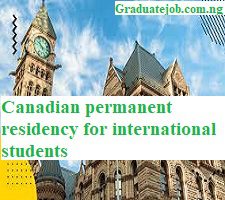Canadian permanent residency for international students allows international students to build a long-term presence in the country. Students can transfer from temporary study visas to permanent residency through several channels (the Express Entry system, the Canadian Experience Class program, and Provincial Nominee Programs). The Post-Graduation job Permit allows students to get significant Canadian job experience while advancing their chances of permanent residency. Students who obtain permanent residency in Canada will be able to live, work, and flourish in a country noted for its excellent quality of life, numerous possibilities, and inclusive society. Let’s look into the eligibility criteria for permanent residency in Canada
Read More: Are Parent Plus Loans Eligible For Forgiveness
Eligibility criteria for Canadian permanent residency for international students
International students must meet different criteria to show their potential for long-term living and working in Canada when applying for Canadian permanent residency. Here are four major eligibility requirements:
Education: International students must have graduated from a recognized Canadian educational institution. This could include degrees, diplomas, or certificates, and the duration of the program varies depending on the specific immigration method. You may have to prove your educational qualifications by presenting transcripts and educational certificates.
Language Proficiency: English or French proficiency is required for successful acceptance into Canadian society. The International English Language Testing System (IELTS) or the Canadian English Language Proficiency Index Program (CELPIP) for English, and the Test d’évaluation de français (TEF) for French, are essential for most immigration programs. To show appropriate language skills, a minimum score on these examinations is usually necessary.
Work Experience: Some immigration processes may require candidates to have worked in Canada, usually through the Post-Graduation Work Permit (PGWP). Work experience gotten in Canada can help them gain eligibility and points under programs such as the Canadian Experience Class (CEC) or the Federal Skilled Worker Program (FSWP).
Financial Stability: Applicants must show their financial ability to sustain themselves and their family members throughout their stay in Canada. This includes verification of funds to pay living expenditures like lodging, transportation, and healthcare. The exact amount necessary may differ based on the size of the family and the province of the proposed residence.
Meeting these eligibility requirements proves that international students have the necessary educational background, language skills, work experience, and financial resources to contribute to the Canadian economy and successfully integrate into Canadian society. Let’s now discuss the ways to get Canadian permanent residency for international students.
Canadian permanent residency: The Express Entry systems for international students
The Express Entry system is the principal route for skilled immigrants, including international students, seeking permanent residency in Canada. It is a fast and quick procedure that allows candidates to showcase their abilities and qualifications. International students can use the Express Entry system by creating an online profile and confirming their desire to permanently immigrate to Canada. They are then evaluated using the Comprehensive Ranking System (CRS) based on a variety of criteria. The CRS allocates points to candidates based on variables such as age, education, work experience, language competency, and flexibility.
Higher levels of education, language competence in English or French, competent work experience in Canada or abroad, and having a valid employment offer in Canada all get points on the CRS. You can earn additional points for factors such as having a province nomination gained through province Nominee Programs (PNPs) or having a family member who is a Canadian citizen or permanent resident. Candidates with the highest CRS scores receive invites to apply for permanent residency through periodical drawings performed by the Canadian government. Those who obtain an invitation must next complete an application for permanent residency within a certain time range.
The Express Entry system enables foreign students to boost their prospects of gaining permanent residency by using their education, and work experience earned in Canada. It provides a transparent and competitive process in which candidates with higher CRS scores have a better chance of receiving an invitation to apply.
READ MORE: How Do Student Loans Work: Guide For First-Time
Canadian permanent residency: Canadian Experience Class (CEC) program
The Canadian Experience Class (CEC) program provides a way for foreign students who have gained Canadian work experience to apply for permanent residency in Canada. This initiative celebrates international students’ exceptional contributions to the Canadian workforce and society. International students must have completed at least one year of skilled, professional, or technical work experience in Canada during the last three years to be eligible for the CEC program.
You must have some experience after graduating from a Canadian educational institution. You must have been in a skilled occupation as defined by the National Occupational Classification (NOC) system. Work experience points for the CEC program are based on the period and type of work experience. Candidates can gain extra points for English or French language skills, as well as education, age, and adaptability criteria.
Canadian permanent residency: Provincial Nominee Programs (PNPs)
Provincial Nominee Programs (PNPs) in Canada give foreign students extra options for attaining permanent residency. Each province and territory in Canada has its own PNP, with distinct streams and criteria adapted to their specific labor market and economic needs. International students might benefit from these programs by researching PNPs that match their skills, qualifications, and preferred province of residency. Many PNPs offer dedicated tracks for international graduates, recognizing the importance they contribute to the local economy.
PNPs might be beneficial to foreign students since they frequently have lower CRS score criteria than the federal Express Entry system, making qualification easier. Furthermore, PNPs can speed the processing of permanent residency petitions, providing a more rapid pathway.
Post-Graduation Work Permit (PGWP)
The Post-Graduation Work Permit (PGWP) bridges the gap between foreign students’ study in Canada and their path to permanent residency. The PGWP allows international students who have finished a program of study at an approved Canadian educational institution to work in Canada for a set length of time, usually between eight months and three years. Foreign students can earn important Canadian job experience through the PGWP, which is highly valued in the immigration process. Work experience earned during the PGWP period may qualify them for permanent residency through other immigration programs such as the Canadian Experience Class (CEC) or the Federal Skilled Worker Program (FSWP).
READ MORE: How To Apply For Students Loans In the UK
The Bottom Line
Canadian permanent residency allows international students to build a long-term presence in Canada by using their education, employment experience, and language skills. Students can pursue their dream of permanent residency in Canada through the Express Entry system, Provincial Nominee Programs, Post-Graduation Work Permit (PGWP) or the Canadian Experience Class.






